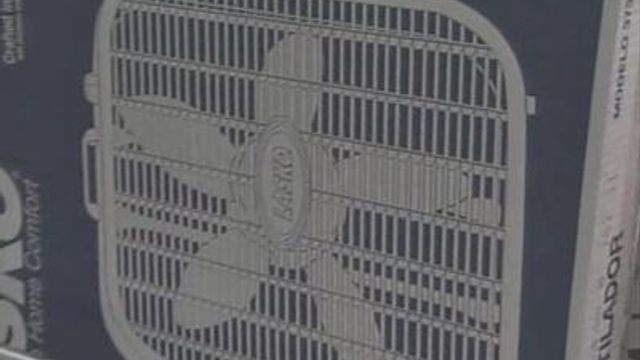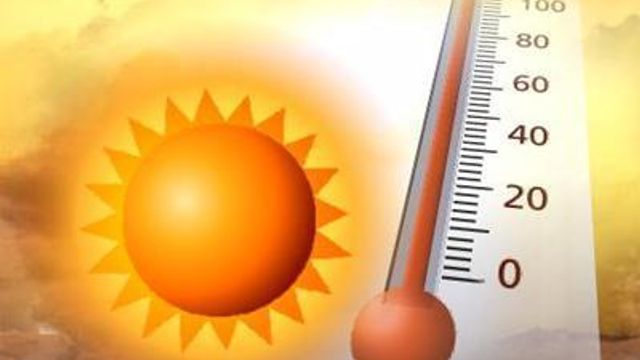Triple-digit heat hits the Triangle
As temperatures soared Thursday, the governor and state health officials urged people to stay out of the hot sun, if possible, and to take measures to keep themselves safe.
Posted — UpdatedTemperatures hovered around the 100-degree mark Thursday, prompting the National Weather Service to issue a heat advisory and the governor urging caution amid excessive heat.
Fayetteville reported reaching the century mark, while the thermometer at Raleigh-Durham International Airport was 1 degree shy of doing so. Most other areas in the central part of the state also came close.
Heat indices registered temperatures as high as 109 degrees in Fayetteville and as low as 100 degrees in Greensboro.
Slight relief from the heat is forecast for Friday with highs in the mid-90s expected. A cool front moving north and west will lessen the heat for the weekend, and temperatures could drop below the mid-80s by next Thursday.
"We are now on pace to have this be the warmest June on record, going all the way back to World War II – assuming the next six days are anywhere close to what we're forecasting," WRAL chief meteorologist Greg Fishel said.
The brutal temperatures had state officials, including Gov. Bev Perdue, urging people to stay inside, if at all possible, and take things easy to help avoid heat-related illnesses.
"We are just starting the summer vacation season, and we all need to make sure we take precautions to avoid heat-related health problems,” Perdue said. “This is particularly important for the elderly, those with physical or medical conditions that are sensitive to high temperatures and young children."
Meals on Wheels in Durham handed out more than 30 fans to elderly residents Thursday – and 50 over the past two days. Wake County's Cool for Wake Program reported distributing 81 fans and eight air conditioners to those who qualify.
A Code Orange air-quality alert, meanwhile, remained in effect for much of Central North Carolina, meaning people, especially those with respiratory problems, should limit outdoor activities.
"It really does take a toll on you," said Johnny Whittington, a mail carrier making his rounds in Raleigh Thursday. "Get a good night's sleep, and stay pretty well-rested, because this time of year, it's going to drain you."
With temperatures in the high 70s around sunrise, some Raleigh residents ventured out to exercise on the track at Chavis Park Community Center.
"A lot of people (are) trying to beat the heat," walker Lonetta Raynor said. "You come out before you go to work, get your exercise in. It helps you start your day."
Whittington, who's delivered mail in an un-air-conditioned truck for 17 years, said he can think of worse work for the heat.
"This beats the heck out of working tobacco or in construction, I can tell you that," he said.
The Department of Health and Human Services recommends anyone who must be outside to drink plenty of non-alcoholic, sugar-free fluids to stay hydrated.
Everyone is at risk of heat-related injuries, but infants and children younger than 4, as well as people over 65, those who are excessively overweight and physically ill are most susceptible:
Other recommendations for avoiding heat-related injuries:
- Don't stay inside a vehicle, and don't leave children or pets – even for a few minutes. Interiors heat up quickly.
- Don't wait until you're thirsty to drink.
- If exercising outdoors, drink two to four glasses of water each hour to help replace salt and minerals in the body that are lost in sweat.
- Wear lightweight, light-colored clothing, and use sunscreen of SPF 15, or higher, 30 minutes prior to being outside.
- Check on older neighbors at least twice a day.
- Limit outdoor activity to the morning and evening hours if you have to be outside. Have plenty of water on-hand when working in the heat.
Heat cramps, signaled by abdominal, arm and leg cramps, are the first sign of heat injury.
Heat exhaustion, a milder form of heat-related illness, can develop after several days of exposure to high temperatures and inadequate replacement of fluids.
Warning signs include heavy sweating, muscle cramps, dizziness, headaches, cool and moist skin, a fast pulse rate and fast and shallow breathing.
Heat stroke, which can cause injury or death if not treated, occurs when the body's temperature rises rapidly, sweating mechanisms fail and the body can't cool.
Body temperature might rise to 106 degrees or higher rapidly, within 10 to 15 minutes. Warning signs include red, hot, dry skin with no sweating; rapid, strong pulse; throbbing headache; dizziness; nausea; confusion; or unconsciousness.
• Credits
Copyright 2024 by Capitol Broadcasting Company. All rights reserved. This material may not be published, broadcast, rewritten or redistributed.






